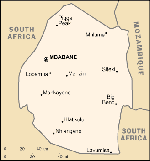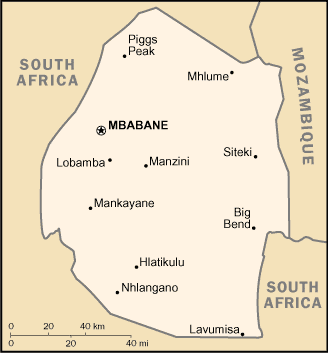 Swaziland
Swaziland
Country Specific Information
On this page » |
|
August 06, 2008
COUNTRY DESCRIPTION:
 Swaziland is a small developing nation in Southern Africa. Several well-developed facilities for tourism are available.
The capital is Mbabane. Read the Department of State Background Notes on Swaziland for additional information.
Swaziland is a small developing nation in Southern Africa. Several well-developed facilities for tourism are available.
The capital is Mbabane. Read the Department of State Background Notes on Swaziland for additional information.
ENTRY/EXIT REQUIREMENTS: A passport is required. Visas are not required for tourists and business travelers arriving in Swaziland for short visits
(less than 60 days) on standard U.S. passports. Most travelers visiting Swaziland enter through South Africa.
PLEASE NOTE: All travelers traveling to South Africa are strongly encouraged to have several unstamped visa pages left in their passports.
South Africa requires two unstamped visa pages, excluding amendment pages, to enter the country. Visitors who do not have
enough free visa pages in their passport risk being denied entry and returned to the U.S. at their own expense.
For further information on Swaziland’s visa requirements, contact the Embassy of the Kingdom of Swaziland, 1712 New Hampshire
Avenue NW, Washington, DC 20009; phone (202) 234-5002. Visit the Embassy of Swaziland web site at http://www.swazilandembassyus.com/ for the most current visa information.
Information about dual nationality or the prevention of international child abduction can be found on our web site. For further information about customs regulations, please read our Customs Information sheet.
SAFETY AND SECURITY: Public protests, demonstrations, and strikes occur from time to time in Swaziland and are mostly in response to on-going labor relations/difficulties. When a strike is pending, armed soldiers may be called to augment the police force, and they have used force to disrupt such events. During the course of such events, police may not distinguish between “innocent bystanders” and protesters. Americans should avoid crowds, political rallies and street demonstrations.
For the latest security information, Americans traveling abroad should regularly monitor the Department of State, Bureau of Consular Affairs’ web site at http://travel.state.gov, where the current Travel Warnings and Travel Alerts, as well as the Worldwide Caution, can be found.
Up-to-date information on safety and security can also be obtained by calling 1-888-407-4747 toll free in the U.S. and Canada, or for callers outside the U.S. and Canada, a regular toll-line at 1-202-501-4444. These numbers are available from 8:00 a.m. to 8:00 p.m. Eastern Time, Monday through Friday (except U.S. federal holidays).
The Department of State urges American citizens to take responsibility for their own personal security while traveling overseas. For general information about appropriate measures travelers can take to protect themselves in an overseas environment, see the Department of State’s pamphlet A Safe Trip Abroad.
CRIME: Violent crime is a concern and is the most significant threat to American citizens visiting or working in Swaziland. Incidents
of petty crime and occasionally violent crime are most prevalent in Mbabane, the capital city, and Manzini, Swaziland’s urban
industrial center, but also affect most other urban and rural areas. Criminals will resort to force if necessary, including
deadly force, in order to accomplish their goal. Gangs are not deterred by confrontations with their intended victims. Carjacking
occurs and, as with other crimes, can be potentially violent if victims do not immediately cooperate.
Congested dark urban areas are particularly dangerous at night and daytime attacks are not uncommon. The presence of others
on the street should not be misinterpreted as an indication of security. Many victims report being robbed in the presence
of large numbers of witnesses. Pedestrians are cautioned not to wear jewelry or carry expensive or unnecessary valuables
in public. American citizens are also advised against displaying cell phones and large sums of cash, as they are targets
for thieves. Money should only be converted at authorized currency exchanges and never with street vendors.
Crime victims should immediately report the incident to the nearest police station. If there is an emergency, the police
can be contacted by dialing 999.
INFORMATION FOR VICTIMS OF CRIME: The loss or theft abroad of a U.S. passport should be reported immediately to the local police and the nearest U.S. Embassy or Consulate. If you are the victim of a crime while overseas, in addition to reporting to local police, please contact the nearest U.S. Embassy or Consulate for assistance. The Embassy/Consulate staff can, for example, assist you to find appropriate medical care, contact family members or friends and explain how funds could be transferred. Although the investigation and prosecution of the crime is solely the responsibility of local authorities, consular officers can help you to understand the local criminal justice process and to find an attorney if needed.
The local equivalent to the “911” emergency line in Swaziland is: 999.
See our information on Victims of Crime.
MEDICAL FACILITIES AND HEALTH INFORMATION: Medical facilities are limited throughout Swaziland. Although the Mbabane Clinic in the capital is small and currently undergoing building renovations, it is well equipped and well staffed for minor procedures. For advanced care, Americans often choose to go to South Africa where better facilities and specialists exist. Most prescription drugs are available locally or can be imported from South Africa, but travelers are advised to bring sufficient quantities of their own required medication. A doctor’s note describing the medication may be helpful if questioned by authorities.
The U.S. Department of State is unaware of any HIV/AIDS entry restrictions for visitors to or foreign residents of Swaziland.
Information on vaccinations and other health precautions, such as safe food and water precautions and insect bite protection, may be obtained from the Centers for Disease Control and Prevention’s hotline for international travelers at 1-877-FYI-TRIP (1-877-394-8747) or via the CDC’s web site at http://wwwn.cdc.gov/travel/default.aspx. For information about outbreaks of infectious diseases abroad consult the World Health Organization’s (WHO) web site at http://www.who.int/en. Further health information for travelers is available at http://www.who.int/ith/en.
MEDICAL INSURANCE: The Department of State strongly urges Americans to consult with their medical insurance company prior to traveling abroad to confirm whether their policy applies overseas and whether it will cover emergency expenses such as a medical evacuation. Please see our information on medical insurance overseas.
TRAFFIC SAFETY AND ROAD CONDITIONS: While in a foreign country, U.S. citizens may encounter road conditions that differ significantly from those in the United States. The information below concerning Swaziland is provided for general reference only, and may not be totally accurate in a particular location or circumstance.
Traffic accidents in Swaziland may pose an even greater hazard than crime. Visitors should use extreme caution when driving, given the relatively high rates of speed of drivers on major thoroughfares. Other hazards include poor lighting and traffic signals; presence of pedestrians, animals, and slower moving vehicles; aggressive driving behavior; and erratic stopping for pedestrian and animals. Traffic drives on the left in Swaziland, which requires U.S. drivers to exercise particular caution. Special care should be used in driving at night and in fog, especially in rural areas. Rural and suburban areas are poorly lit and pose additional safety hazards as pedestrians and animals cross the road. Many vehicles are poorly maintained and lack headlights.
Extreme caution is recommended if/when using mini-bus taxis, which follow fixed routes and are flagged down by passengers almost everywhere on the streets and roads of Swaziland. Many of these vehicles fail to meet minimal safety standards. Drivers frequently overload the vehicles and travel at excessive speeds. Fatal accidents involving these conveyances are very common.
Please refer to our Road Safety page for more information. Visit the website of the country’s national tourist office and national authority responsible for road safety at www.sntc.org.sz/index.asp.
AVIATION SAFETY OVERSIGHT: The U.S. Federal Aviation Administration (FAA) has assessed the Government of Swaziland’s Civil Aviation Authority as not being in compliance with International Civil Aviation Organization (ICAO) aviation safety standards for oversight of Swaziland’s air carrier operations. For more information, travelers may visit the FAA’s web site at http://www.faa.gov/safety/programs_initiatives/oversight/iasa.
SPECIAL CIRCUMSTANCES: It is illegal to photograph Swaziland’s government buildings, members of the Swazi armed forces, royal residences and official ceremonies without prior permission from government authorities. Please see our Customs Information.
CRIMINAL PENALTIES: While in a foreign country, a U.S. citizen is subject to that country's laws and regulations, which sometimes differ significantly from those in the United States and may not afford the protections available to the individual under U.S. law. Penalties for breaking the law can be more severe than in the United States for similar offenses. Persons violating Swaziland laws, even unknowingly, may be expelled, arrested or imprisoned. Penalties for possession, use, or trafficking in illegal drugs in Swaziland are severe, and convicted offenders can expect long jail sentences and heavy fines. Engaging in sexual conduct with children or using or disseminating child pornography in a foreign country is a crime, prosecutable in the United States. Please see our information on Criminal Penalties.
CHILDREN'S ISSUES: For information see our Office of Children’s Issues web pages on intercountry adoption and international parental child abduction.
REGISTRATION / EMBASSY LOCATION: Americans living or traveling in Swaziland are encouraged to register with the nearest U.S. Embassy or Consulate through the State Department’s travel registration web site so that they can obtain updated information on travel and security Swaziland. Americans without Internet access may register directly with the nearest U.S. Embassy or Consulate. By registering, American citizens make it easier for the Embassy or Consulate to contact them in case of emergency. The U.S. Embassy is located in the Central Bank Building on Mahlokohla Street in the capital city of Mbabane. The mailing address is Box 199, Mbabane, Swaziland. The telephone number is (268) 404-6441/5; fax (268) 404-5959.
* * *
This replaces the Country Specific Information for Swaziland dated January 22, 2008, to update the section on Information for Victims of Crime and Medical Facilities and Health Information.

